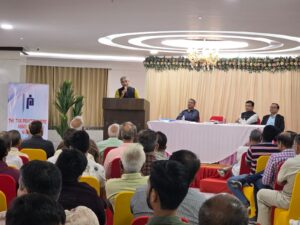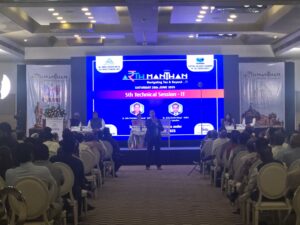GST WEEKLY UPDATE : 45/2024-25 (09.02.2025) By CA Vipul Khandhar

-By CA Vipul Khandhar
- Procedure to be followed in department appeal filed against interest and/or penalty only, related to Section 128A of the CGST Act, 2017 – (Ins 02/2025 dt. 07.02.25):
Kind attention is invited to the Section 128A of the Central Goods and Service Tax Act, 2017 (hereinafter referred as ‘the CGST Act’) read with Rule 164 of the Central Goods and Service Tax Rules, 2017 (hereinafter referred as ‘the CGST Rules’) which provides waiver of interest or penalty or both, relating to demands under section 73 of the CGST Act pertaining to Financial Years 2017-18, 2018-19 and 2019-20, subject to certain conditions. Further vide Circular No. 238/32/2024-GST dated 15th October, 2024, various doubts related to section 128A were clarified.
- In this regard, references have been received from various field formations seeking clarification from the Board as to whether the benefit of section 128A (supra) be extended to taxpayers in cases where the tax amount has been paid but the department has gone in Appeal on the basis of wrong arithmetic calculation of interest, or where penalty is either not imposed or imposed less than the prescribed threshold etc.
- The matter has been examined by the Board. It has been observed that at S. No. 4 of the Table under para 4 in the aforesaid circular, it is clarified that cases where the tax due has already been paid and the notice or demand orders under Section 73 only pertains to interest and/or penalty involved, the same shall be considered for availing the benefit of section 128A. Hence, it is evident that in cases where the taxpayer has paid the full amount of tax and only interest and/or penalty is in dispute by the taxpayer, then he is eligible to avail the benefit of Section 128A of the CGST Act. On the similar pattern, it is felt that just because the department has gone in appeal or is in the process of filing an appeal, a taxpayer who is otherwise eligible for availing the benefit of section 128A, should not be denied the benefits. Further the intention of the said provision is to reduce litigation and a taxpayer should not be denied the benefit of the provision on mere technicalities.
- Based on the above, it is decided that in cases where the tax amount has been fully paid by the taxpayer on demands made under section 73 of the CGST Act and the department is in appeal or under the process of filing an appeal only on account of wrong interest calculation and/or wrong imposition or non-imposition of penalty amount under the provisions of CGST Act or IGST Act and the taxpayer fulfils other conditions of section 128A and the rules made thereunder, the proper officer may proceed towards withdrawing such appeal filed and in case where the order under section 73 is under review stage only, accept the same.
- ADVISORY ON E-WAY BILL GENERATION FOR GOODS UNDER CHAPTER 71 (Feb 6th, 2025) No E way require for movement of gold , silver & diamond jewellery:
Clarification on E-Way Bill Requirement for Goods under Chapter 71:
Rule 138(14) of the Central Goods and Services Tax (CGST) Rules, 2017, read with its Annexure S.Nos. 4 and 5, states that goods covered under Chapter 71 viz., Natural or cultured pearls and precious or semi-precious stones; precious metals and metals clad with precious metal, Jewellery, goldsmiths’, and silversmiths’ articles, except those classified under HSN 7117(Imitation Jewellery), are exempt from the mandatory requirement of generating an E-Way Bill.
Pursuant to the introduction of the E-Way Bill (EWB) for goods classified under Chapter 71, excluding HSN 7117 (Imitation Jewellery), in the state of Kerala for intra-state movement, the National Informatics Centre (NIC) has provided an option to generate EWBs for goods covered under Chapter 71 except 7117 under the category “EWB for Gold” on the EWB portal.
It has been observed that various industry stakeholders have voluntarily been generating EWBs for goods under Chapter 71 due to the availability of this option in the EWB system. In this regard, it is clarified that while the system previously allowed EWB generation for goods under Chapter 71, this facility has now been withdrawn.
Accordingly, taxpayers and transporters engaged in the movement of goods under Chapter 71 (except HSN 7117) are advised that EWB generation is not required. However, it may be noted that for the intrastate movement of such goods within the state of Kerala, the generation of an EWB has been mandated vide Notification No.10/24-State Tax dated 27/12/24 issued by the state of Kerala. An advisory dated 27.01.2025 has already been issued in this regard.
- AAR & Important Judgements:
(i) AAR On Turnkey EPC Contracts:
(Applicant – Thyssenkrupp Industrial Solutions (India) Private Limited)
The Advance Ruling Authority (AAR) Gujarat examined the GST applicability on a turnkey Engineering, Procurement, and Construction (EPC) contract executed by Thyssenkrupp Industrial Solutions (India) Pvt. Ltd. for IOCL’s Catalytic Dewaxing Unit (CDWU) project at Gujarat Refinery. The applicant contended that the contract consisted of two distinct components: supply of imported goods on a high sea sale (HSS) basis and erection and commissioning of the CDWU. However, the AAR ruled that these components formed an indivisible composite contract, subject to uniform GST treatment as a works contract service under Section 2(119) of the CGST Act, 2017.
The AAR noted that the turnkey nature of the contract made Thyssenkrupp responsible for all activities, including design, procurement, construction, and commissioning. Despite separate work orders for supply and services, the AAR concluded these were not severable, citing Black’s Law Dictionary, which defines a severable contract as one with independent promises that can be separately enforced. Here, the goods and services were interdependent, making the contract composite and inseparable.
Judicial precedent from Kone Elevator India Pvt. Ltd. v. State of Tamil Nadu (Supreme Court) was instrumental in the ruling. The Court previously clarified that a works contract is taxable as a service under GST, irrespective of its goods and services components. This interpretation aligns with the 46th Constitutional Amendment, which enabled the taxation of composite contracts. The AAR further referenced Schedule II of the CGST Act, emphasizing that contracts involving immovable property, such as the CDWU project, qualify as works contracts.
Additionally, the AAR addressed the applicant’s claim that the HSS component could be treated independently to leverage the benefits of the Manufacture and Other Operations in Warehouse Regulation, 2019 (MOOWR). The ruling dismissed this argument, stating that the contractual terms explicitly tied the goods supply to their movement and installation at the IOCL site. Consequently, the GST treatment was determined by the place of supply rules under Section 10(1) of the IGST Act, which link supply to the final destination of goods.
(ii) AAR On GST on Takeaway vs Restaurant Sales:
(Applicant – Riddhi Enterprise)
In Riddhi Enterprise (GST AAAR Gujarat), the Gujarat Appellate Authority for Advance Ruling (AAAR) examined whether pre-packaged food sold over the counter qualifies as “restaurant services” under GST law. The appellant, engaged in the restaurant business, prepared and sold food items for dine-in and takeaway but also sold pre-packaged food purchased from external vendors. They contended that all sales, including pre-packaged items, should be classified under “restaurant services” with 5% GST and no input tax credit (ITC). However, the Gujarat Authority for Advance Ruling (GAAR) ruled that only food prepared in the restaurant qualifies as restaurant service, while pre-packaged food sold over the counter is a supply of goods, attracting applicable GST with ITC benefits.
Upon appeal, the AAAR upheld GAAR’s ruling, rejecting Riddhi Enterprise’s argument. The ruling referenced previous cases, such as Kundan Mishthan Bhandar and Gangaur Sweets, but found them inapplicable due to factual differences. The AAAR concluded that pre-packaged food purchased from the market and sold directly is distinct from restaurant service and should be taxed accordingly. The decision clarifies GST applicability for restaurants engaged in both food preparation and retail sales, distinguishing between services and goods for tax purposes.
(iii) AAR On Inclusion of sharpeners & erasers with pencil kits is mixed supply
(Applicant – DOMS Industries P Ltd.)
Gujarat Appellate Authority for Advance Ruling (AAAR) upheld the previous ruling on the GST classification of DOMS Industries P Ltd.’s stationery kits. The company, which manufactures and supplies stationery products, had sought clarification on whether the inclusion of sharpeners and erasers with pencil kits would affect the GST rate. The Gujarat Authority for Advance Ruling (GAAR) had previously determined that such supplies constituted a “mixed supply” rather than a “composite supply.” The ruling was based on the fact that sharpeners and erasers, though sold together with pencils, were not naturally bundled or essential components of the pencils. Additionally, the GAAR noted that while some companies in the industry sold these products together, they were also sold independently, making it difficult to establish a principal supply. Consequently, the tax rate applicable to the entire kit was determined based on the highest rate applicable to any of the included items.
DOMS Industries challenged the ruling, arguing that the industry practice justified considering the products as a composite supply. However, the AAAR rejected the appeal, affirming the original ruling that the supply was mixed and should be taxed accordingly. As a result, the stationery kits, which include sharpeners, would attract a 12% GST rate, determined by the item with the highest tax rate among the included goods. The decision highlights the importance of classification in GST law, reinforcing that the mere packaging of multiple items together does not automatically qualify them as a composite supply. The ruling also sets a precedent for similar cases in the stationery industry, requiring businesses to carefully evaluate their tax liabilities when bundling products.
Disclaimer:
This publication contains information for general guidance only. It is not intended to address the circumstances of any particular individual or entity. Although the best of endeavour has been made to provide the provisions in a simpler and accurate form, there is no substitute to detailed research with regard to the specific situation of a particular individual or entity. We do not accept any responsibility for loss incurred by any person for acting or refraining to act as a result of any matter in this publication.
(The author is a well known Chartered Accountant practicing in the field of Direct and Indirect taxes at Ahmedabad)




